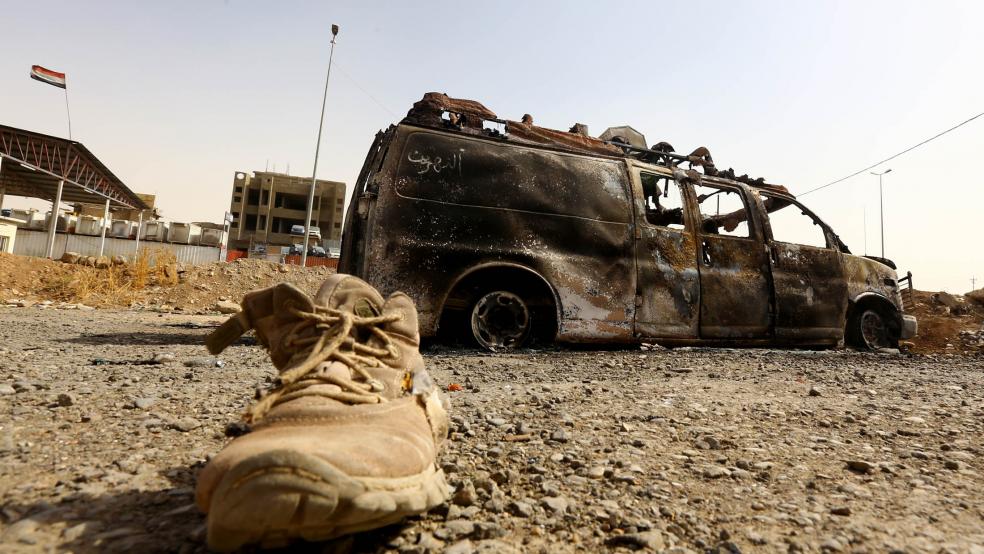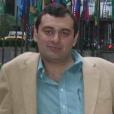On the night of April 22, 2015, the Hadid family was preparing for another ordinary night in war-torn Iraq. Their home, in Mosul, a city in Northern Iraq, is now controlled by ISIS, and the Hadid’s had witnessed a mass exodus of Christians and other vulnerable groups as ISIS swept through the city in 2014, beheading Iraqi soldiers and crucifying others.
Although the Iraqi forces outnumbered ISIS 15 to 1, their will to fight the jihadists went from low to zero as they fled their posts, abandoned their American made weapons, and blended in with the civilian population in the face of continued ISIS assaults.
Related: ISIS Burns 8000 Rare Books and Manuscripts in Mosul
For the U.S. and its allies, retaking Mosul, considered Iraq’s “second city,” is essential to the well-being of more than 500,000 residents who could be killed if ISIS breached the Mosul Dam and flooded areas along the Tigris River. President Obama told reporters in August of 2014, “If that dam was breached, it could have proven catastrophic.” The American assessment went so far as to say that the capture of the area put ISIS in control of a weapon of mass destruction. That assessment prompted the U.S. to begin air attacks against ISIS in Iraq. And so the bombing began…again.
The Hadids lived next door to a Christian family who had fled Mosul, and ISIS turned that house into a weapons depot. That fateful night, an American air strike bombed the depot. The Hadid home was also hit.
A Family Tragedy
The Hadids were part of a large distinguished family, well known in Mosul and Iraq as wealthy intellectuals. Despite their status, the family wasn't doing very well.
“The head of the family, 58-year old Gassan who owned a small electronics business, is one of the generation of men who was crushed by Saddam Hussein's wars that started in 1980 with Iran and never stopped,” says Omar Hadid, a cousin. Gassan's wife Sumaiya was a kindergarten teacher. “She liked to read a lot. Her books were her best friends,” says Amer Hadid, another cousin of the family.
Related: Why a Military Victory Over ISIS Is Wishful Thinking
They had three sons. Mohammed, 30 helped his father at the family business. Mohammed's wife, Fadhila was a 24-year old homemaker. “She was beautiful, funny, always smiling...religious and had a good heart,” remembers her father Wisam Salim, a businessman who lives in Istanbul.
It was her religiousness that gave her the strength to cope with her daughter Sidrah's illness that required five years of treatment. But Sidrah's battle with cancer was lost in February 2015 despite trips to Turkey and Jordan for treatment.
They still had Abdullah, their son. Amer recalled, “He loved his little car...He also loved animals. His grandfather promised him with a dog. Abdullah was waiting for it.” Amer also remembered that about a week before the bombing, the 4-year old Abdudallah said, “I want to see Sidrah in heaven.”
Like many other Iraqi families, the Hadid household had their share of post 2003 violence and insecurity. “In 2006, Mohammed was kidnapped by unidentified gunmen.... He was released only after his family paid $60,000 to the kidnappers,” adds Omar.
Mohammed had two brothers as well. Muthanna, 33, worked at the family business and Maan, 19, was a high school student. Muthanna liked to play soccer and watch it, too. “He loved Real Madrid,” added Amer.
Related: Kurdish Leader Doubts Obama Has an ISIS Plan
No Escape
When ISIS captured Mosul in June 2014, the Hadid family left the city for the safety of the Kurdistan region. But the family owed money to some businessmen who turned to ISIS for help. “ISIS let the family know via middlemen that if they didn't come back, they would confiscate their house and business,” Omar said.
Last August, an Iraqi air strike killed another family member. Dr. Akram Hadid, a college professor, his wife and their four children were wiped out when a missile hit their house in Mosul. Two weeks earlier, Muthanna Hadid demanded in a post on Facebook that the random shelling of civilians in Mosul be stopped.
 On April 20, 2015, a US airstrike destroyed a house in Mosul that was used as an ISIS arms storage. It killed about 20 ISIS militants. It also killed eight civilians. “At first, there weren't any civilian casualties when the first missile hit; in fact, it cost ISIS about 20 of its militants with their cars and arms, then the civilians gathered at the scene to check the nearby houses. Then the aircraft struck the crowd, killing eight and injuring 26 civilians,” says Maouris Milton, a blogger from Mosul.
On April 20, 2015, a US airstrike destroyed a house in Mosul that was used as an ISIS arms storage. It killed about 20 ISIS militants. It also killed eight civilians. “At first, there weren't any civilian casualties when the first missile hit; in fact, it cost ISIS about 20 of its militants with their cars and arms, then the civilians gathered at the scene to check the nearby houses. Then the aircraft struck the crowd, killing eight and injuring 26 civilians,” says Maouris Milton, a blogger from Mosul.
Two days later at 10 pm, the Hadid family members were busy in their normal daily business. The Hadid's house was relatively large. Gassan was in the garden. His wife was in the kitchen. Mohammed was off to fill his car's tank. Maan was by the house's front gate. Fadhila was in her room playing with her son Abdullah. Muthanna was home to watch a soccer match.
Related: The Taking of Ramadi—Behind ISIS’s Bloody Assault
The Christian family next door was forced to flee Mosul in the summer of 2014. ISIS had used that house for weapons storage. Shortly after 10 pm, it was hit by up to seven missiles. Because the Christian family's house was small, at least one of the missiles struck the Hadids’home. Maan survived. His father was injured. Sumaiya, Muthanna, Fadhila and Abdullah were killed immediately. Their house was destroyed.
Grief Upon Grief
The three surviving men were devastated. They were already grieving for the late Sidrah when they had to deal with the loss of four more members of the family.
Mohammed sought refuge in religion as many do in catastrophes. Even the strongest believers are torn in the wake of such a terrible loss. “Something inside us couldn't be forgotten, despite that we pretend to forget...I don't know for whom I should grieve. One piece of our heart could heal, but how could four?” he posted on Facebook.
A month later Mosul there was another devastating air strike on one of ISIS’s safe houses in Mosul. “The targeted ammunition storage was storing weapons and heavy ammunition...The number of civil casualties rose to 25 and more than 50 injured with complete destruction of the surrounding houses around the targeted site,” adds Milton.

A week ago, another airstrike hit ISIS main car bomb factory in the city of Hawija, south of Mosul. Three blocks were completely leveled. At least 70 people were killed and 150 were injured. Half of the dead were ISIS members and the rest were civilians.
Related: ISIS’s Capture of Palmyra—A Return to Barbarism
In May, the US military admitted for the first time that some of its air strikes had caused civilian deaths in Syria. In a statement, US Central Command said the strikes “likely led to the deaths of two non-combatant children.” The report went on to say strikes “likely resulted in the destruction of Khorasan Group-affiliated targets that had been converted to military use,” adding that “the children had not been assessed as residing at any one of the targets.”
“We regret the unintentional loss of lives,” said Lieutenant General James L. Terry, commander of the Combined Joint Task Force, in a statement. “The Coalition continues to take all reasonable measures during the targeting process to mitigate risks to non-combatants, and to comply with the principles of the Law of Armed Conflict.”
Dr. Samir Hadid, another cousin of the victims who teaches math in a UAE university posted a note on Facebook: “His excellency President Barack Obama...Stop the bombing of the innocent people in Mosul. Stop the killing of the innocent people of Mosul by the international coalition forces that claim the lives of the innocent children, women, youth and all the weak people who are unable to leave their homes.... ”
Would the airstrikes have taken place if the Iraqi army hadn’t abandoned their posts? Would ISIS have blown the dam and killed half a million people? Yesterday, at the G7 meeting in Germany Obama said at a press conference, “We don’t yet have a complete strategy” to deal with ISIS. That after nine months have passed since Obama promised to degrade and destroy the jihadists.
Maybe one of the reasons holding back the shock and awe that American weapons could deliver is the pain and grief of collateral damage—the kind the Hadid family suffered.
Top Reads from The Fiscal Times:





